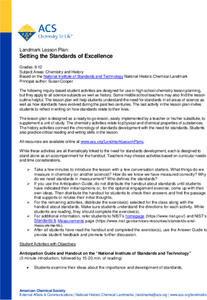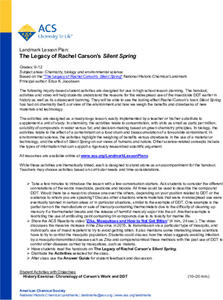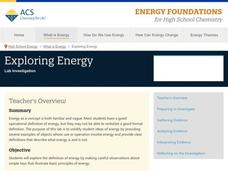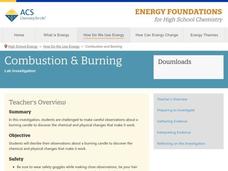American Chemical Society
Matter Is Made of Tiny Particles
Believe in the invisible and convince the class that tiny particles exist even if they can't see them! A thorough lesson investigates all phases of matter and provides pupils hands-on experiences that demonstrate that all matter is made...
American Chemical Society
Periodic Table Trends Activity
The term periodic in periodic table has meaning. Young scientists view a video to learn about the periodic table and then use the provided resources to create their own tables. They focus on patterns of the chemical properties of each...
American Chemical Society
Setting the Standards of Excellence
A number doesn't have much meaning without a standard of reference. Learners read about the history of developing standards to measure chemical and physical properties and complete reading guides to process the information. They focus on...
American Chemical Society
The Legacy of Rachel Carson’s Silent Spring
How do we protect crops and protect the environment at the same time? Using reading materials, learners explore the history of the use of pesticides and biocides. They create a timeline and then explore the current practices.
American Chemical Society
Chlorofluorocarbons and Ozone Depletion
The best of intentions can have negative results. Learners explore the history of the use of chlorofluorocarbons and their effects on the ozone layer. They discover how widely the compound was used because of its unique chemical...
American Chemical Society
Climate Change and the Keeling Curve
Global warming has long been in the making. A thorough review of decades of research helps pupils discover the weather patterns of global warming. Learners then connect the weather changes to data in the Keeling Curve that reveals trends...
American Chemical Society
The Periodic Table and Transuranium Elements
The periodic table has so much more to it than meets the uninformed eye. An inquiry-based lesson leads learners through the history of the discovery of several transuranium elements. They then use informational resources to build a...
American Chemical Society
Hosting a Chemistry Debate
A debate is a forum for discussing controversial topics and environmental chemistry definitely fits that category. The lesson provides everything necessary to run a mini debate tournament. Use the suggested topics or come up with some as...
American Chemical Society
Energy and Entropy of a Stretched Rubber Band
Stephen Perry invented and patented the modern rubber band in 1845. Young scientists put his discovery to work as they use rubber bands to observe entropy and enthalpy. They determine the change in free energy to figure out if it...
American Chemical Society
Entropy and Enthalpy Changes
My room isn't messy — it's a scientific experiment in entropy! Scholars investigate entropy, enthalpy, and spontaneity through a guided procedure and set of questions. The lesson connects the Second Law of Thermodynamics, energy transfer...
American Chemical Society
Exothermic, Endothermic, and Chemical Change
Scientists can't observe bonds breaking or forming, so how do they distinguish between exothermic and endothermic reactions? Young scholars complete two experiments to do just that. They monitor temperature change and calculate the...
American Chemical Society
The Energy Efficiency of Heating Water
Can a small change in laboratory procedures save energy? Scholars test three different methods for heating water in a science lab. Then, they calculate the energy efficiency for each and compare them to determine which uses the least...
American Chemical Society
The Energy of Evaporation
Do all liquids evaporate at the same rate? Young scientists observe the evaporation rate of three different liquids. They measure the time, the temperature, and the change in energy. After comparing the chemical formulas, scholars...
American Chemical Society
Soda Can Steam Engine
Steam engines have been around since the late 1600s, yet most pupils don't know how they work. Using an soda can, the instructor builds a simple steam engine for scholars to observe. Through a discussion, young scientists learn about the...
American Chemical Society
Exploring Energy
When asked to list everyday objects that require energy, most people list technology that use batteries or electricity. Through hands-on exploration, young scientists discover energy is much more than just circuitry. They play with...
American Chemical Society
Combustion and Burning
On Earth, a candle flame points up, but on the International Space Station, it forms a sphere. Young scientists practice their skills by recording observations before, during, and after a candle burns. Chemical and physical changes...
American Chemical Society
Energy Changes in Chemical Reactions
Some chemical reactions produce heat, but what is really going on? Lesson focuses on the concept of energy changes, both exothermic and endothermic. Scholars perform multiple experiments, hands-on activities, and view videos of the...
American Chemical Society
What is a Chemical Reaction?
When a candle burns down, what happens to the mass that appears to be shrinking? Lesson begins with a demonstration of the chemical reaction of a candle burning. Then scholars use atom models to observe conservation of mass concretely.
American Chemical Society
Does Temperature Affect Dissolving?
When making sweet tea, why do people dissolve the sugar in hot tea instead of cold tea? The class discusses the previous lab and builds upon it. Working in groups, they design an experiment to determine how temperature affects the...
American Chemical Society
Using Dissolving to Identify an Unknown
There is a solvent called aqua regis that can dissolve gold! After observing a solubility demonstration, groups receive four known crystals and one unknown. Based on the demo, they design an experiment to determine the identity of the...
American Chemical Society
Represent Bonding with Lewis Dot Diagrams
Lewis dot diagrams, Lewis dot structures, and electron dot diagrams are all the same thing. Young scientists learn how to draw Lewis dot diagrams and come to understand how dots and dashes represent valence electrons and ionic or...
American Chemical Society
Joseph Priestley, Discoverer of Oxygen
Do you want to hear a joke about nitrogen and oxygen? NO. We all know there is oxygen in the air and that plants produce oxygen, but how was it discovered? Scholars read a handout, answer questions, and analyze material in the...
American Chemical Society
Development of Baking Powder
Did you know baking powder can be used to treat acne, whiten teeth, and make sugar cookies? The lesson on the development of baking powder is ready-to-go with no preparation required. Through readings, pupils answer questions, complete...
American Chemical Society
Man and Materials Through History
From the start of the Industrial Revolution, it only took 147 years for someone to invent plastic. This may seem like a long time, but in the history of inventing or discovering new materials, this is incredibly fast. An informative and...

























